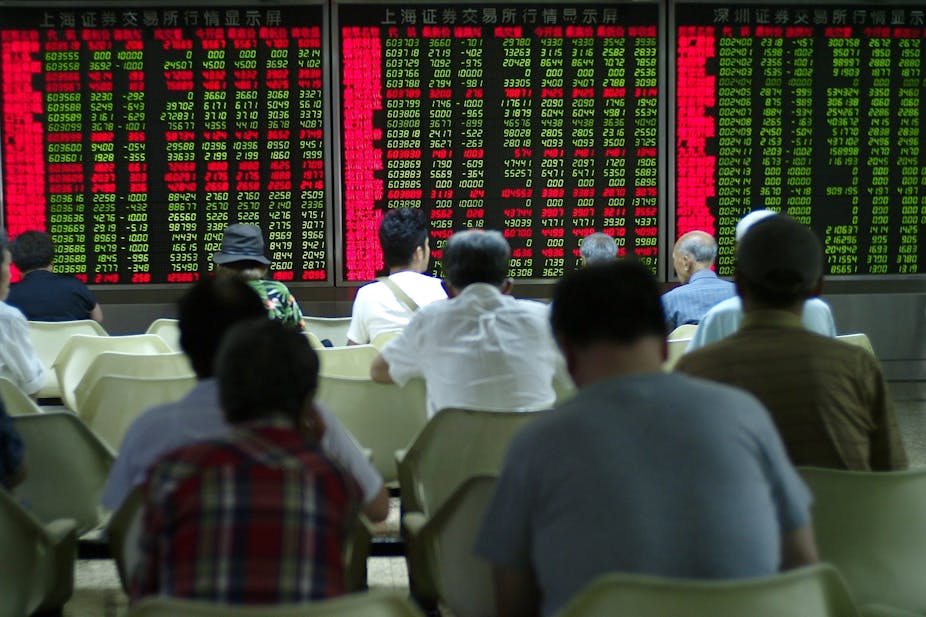Three big lessons came out of the Asian financial crisis of the late 1990s. First, the Asian economies to our north could be a source of economic threat as well as opportunity. Second, economic crises can quickly turn into political ones, as Indonesia’s Suharto among others discovered to his cost. Third, if you’re going to panic about an economy, it’s always best to do it before everyone else does.
Given that Australian investment in China is less than 2% of total outward flows, this advice might seem somewhat redundant. Not so for a new generation of Chinese punters, however. I use the word advisedly: the Shanghai exchange in particular has become the gambling venue of choice for Chinese people with spare cash – even if it’s not actually theirs.
When people start to borrow large sums of money at high interest rates to speculate, it’s a good indicator of an unsustainable bubble that’s about to pop with potentially disastrous social and political consequences.
This would be problem enough in somewhere like Australia or the US. It’s not a good look for central bankers and treasurers to be asleep at the wheel while a bubble inflates on their watch. Just ask the formerly lionised figure of Alan Greenspan.
No matter how damaging such episodes may be, though, they are generally seen as the price that must be occasionally paid for an otherwise dynamic capitalist system.
Things are rather different in China, however. This is supposed to be the People’s Republic; the central government is supposed to have particular duty of care toward the proletariat – even a newly enriched one fired up by timelessly popular get-rich-quick mentality. It is estimated that individual investors own fully four-fifths of China’s shares, a much higher percentage than in the West where institutional investors dominate.
While fear and greed may be universal drivers of stockmarkets, the way governments manage the resultant crises isn’t. It’s important to remember that even if no-one takes socialism seriously in the Middle Kingdom anymore, threats to the supreme political authority of the Chinese Communist Party (CCP) are another matter altogether.
The authority of the CCP, even its widespread political legitimacy, is almost entirely based on its ability to guarantee rising living standards and economic security. Stockmarket crashes, widespread personal indebtedness and a possible collapse of a number of shadow banking institutions wouldn’t do much for either.
So, to borrow a phrase from Vladimir Lenin, one-time icon of the PRC intelligentsia, what is to be done? One might think managing a modestly sized – at this stage, at least – domestic crisis, ought to be a breeze for the CCP’s governing elites.
This is the country that gave the lie to the idea of a “global” financial crisis in the late 2000s. China emerged almost entirely unscathed from a crisis that saw the US teeter on the brink of another Depression and the European Union sink into an economic and political crisis from which it has never really recovered.
And yet, China’s state-led crisis management has come at a cost. Government debt continues to rise at both the central and provincial level. Much of the money spent on warding off recession went into non-essential infrastructure or further inflated an already wobbly real estate sector.
What Premier Li Keqiang famously described as China’s “new normal” economic performance may be a good deal less robust than it was, especially if the government is forced to reduce its own growth-enhancing direct investment.
Significantly, the government is allowing pension funds to invest in the stockmarket as well as creating more liquidity in the banking system. Brokerage funds have also been encouraged to buy shares as a way of trying to stabilise the market.
This is not exactly uncharted territory and is in some ways reminiscent of American policy in the aftermath of the misnamed global financial crisis. It may well work in China too, although it is hard to escape the thought that a day of reckoning will eventually arrive.
If there is a big economic shakeout in China either now or in the future, the consequences could well be far more severe there than they have been in similarly afflicted Western countries where such vicissitudes are generally accepted.
There is simply no similar sort of experience in living memory for China’s population to draw on. In a country where the state remains very much in charge of the economy and much else, the shocking loss of confidence in the government might be truly cataclysmic.
It has become increasingly commonplace to draw attention to some of the underlying political faultlines that have been exposed by recent corruption trials and factional rivalries among Chinese elites. A seismic shock from the stockmarket might shake more than China’s economic fundamentals.
Little wonder China’s leaders are doing all they can to stabilise the situation. They may have more at stake in this than anyone else.

